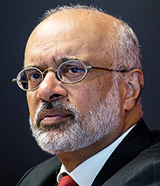Awards for Excellence 2019
|
|
| View full 2019 results |
In the year of Euromoney’s 50th anniversary, the editorial team has spent a lot of time considering how successful banks of the future will look.
Our conclusions? A world-class bank will undoubtedly be a digital leader. It will invest in technology that makes a real difference to how the bank is run and how it interacts with its clients across wholesale and retail businesses. It will mirror many leading pure-play technology companies in the quality and effectiveness of its systems and apps, but it will adapt that DNA to the unique challenges of the banking industry.
It will be a bank that plays to its strengths. It will not grow for growth’s sake. It will take a long-term view, led by a stable and cohesive senior management team, who see themselves not as leaders of a bank today but as stewards of a business that will thrive in the future, while building on the culture of the past.
It will be a diversified bank. That might not mean diversification across multiple geographies, but it will operate across borders. It will probably be a universal bank, where business lines work together and complement each other, and in which a poor quarter or two in one division has a limited impact on the whole.
And it will be a bank that takes its role in broader society seriously, putting corporate responsibility at the heart of what it does. It will apply – rather than just promise – a duty of care to its employees and its clients.
|
|
|
Piyush Gupta |
The bank in the world today that best matches these criteria is DBS, the Singaporean firm led by Piyush Gupta. For that reason, DBS is named as the world’s best bank by Euromoney in 2019.
DBS is the epitome of a regional bank that is clearly world class in what it does. Ask the chief executive of any other leading bank which peers they admire, and DBS is likely to figure in the conversation. It is impossible not to be impressed by the passion, energy and commitment that Gupta and his colleagues bring to the task of making DBS a modern bank for the future world.
Gupta began the strategy six years ago.
“We had to stop thinking: ‘What will other banks do?’ We had to start thinking: ‘What would big tech do?’” he says.
Of course, none of this means anything unless a bank can clearly demonstrate that it has the right model. On that count, DBS scores highly as well. The group had a record year, with a 28% increase in net profit to S$5.63 billion in 2018. Its return on equity, at 12.1%, is the highest it has been since the global financial crisis and in the upper range of cross-border universal banks globally.
In part, this is the result of the deliberate elevation of two high-return businesses, wealth management and cash management, which have grown five and eight times over respectively in the last 10 years. Today the two businesses account for 33% of group income, up from 11% in 2009.
At the same time, the contribution of the volatile treasury and markets group has been deliberately managed down from 22% in 2009 to 5% today (in truth, that downward management probably overshot last year).
We had to stop thinking: ‘What will other banks do?’ We had to start thinking: ‘What would big tech do?’ – Piyush Gupta
All DBS’s numbers are underpinned by tech. Digital customers, by DBS’s definition, account for 48% of the consumer and small business base today, which is good news because at DBS those customers carry a cost-to-income ratio of 34%, compared with 54% for traditional customers, while delivering twice the income per head.
The ability to quantify and position for this difference has been instrumental in the bank’s performance and has helped the cost-to-income ratio fall consistently by half a percentage point a year for a while now. It has further to go, with the consolidation of former ANZ wealth businesses having been a drag on the numbers, now largely absorbed.
DBS is also a stable house, with a non-performing loan ratio that declined from 1.7% to 1.5% during 2018. The common equity tier-1 ratio, at 13.9%, is way above regulatory requirements.
Although its business is still dominated in profitability terms by Singapore and Hong Kong, the bank is well positioned for the future. Income in Greater China beyond Hong Kong grew 31% year on year in 2018, south and southeast Asia by 14%.
Digibank initiatives in India and Indonesia added 1.2 million customers in 2018 – and Gupta is quick to admit that mistakes were made but crucially learned from – along the way.
Digital work continues, with a focus on making technology infrastructure cloud-native: now over 80% of DBS’s open systems are cloud-ready and there are over 60 cloud-native applications.
The bank has published over 350 application programming interfaces (APIs), enabling 90 external partners to integrate the bank’s technologies; it has trained over 10,000 staff on a data-driven curriculum; and has increased its ‘release cadence’ of new applications 10 times over, looking more and more like the tech companies that Gupta so admires.



